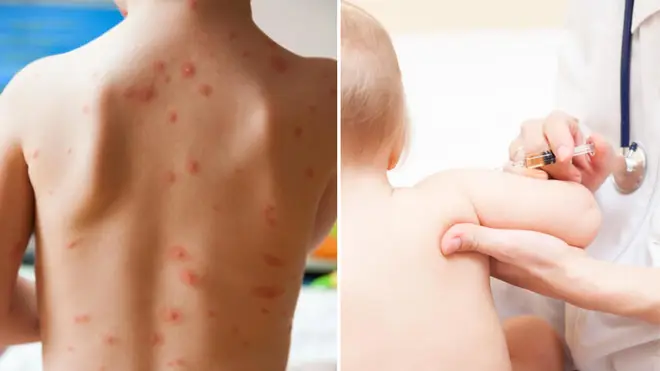
Nick Abbot 10pm - 1am
14 November 2023, 11:31 | Updated: 14 November 2023, 11:39

Government science advisors have said that the chickenpox vaccine should be given on the NHS to prevent the most severe cases.
The joint committee on vaccination and immunisation said that the jab should be given to children at the age of 12 months and 18 months.
The vaccine is not currently on the NHS for most children, because the health service says it wants to limit the risk of the disease.
The chickenpox vaccine has been given in other countries, including the US and Australia, for many years
But health bosses said that rolling out the jab on the NHS could increase the risk of chickenpox and shingles in adults, which can be very dangerous.
Read more: Monkeypox outbreak: What is the virus and how does it spread?
Read more: Strep A: What is Streptococcus and what symptoms should you look for?
Most children recover quickly from chickenpox, although it can be unpleasant. But if a large proportion of people are vaccinated as children, the NHS argues, unvaccinated people could catch it when they're older, and possibly suffer a abd case.
The JCVI said the vaccine, which is known as the varicella jab, would cut the circulation of chickenpox dramatically and prevent most severe cases in children.
The committee said the NHS should provide catch-up vaccines for older children.
Professor Sir Andrew Pollard, chairman of the JCVI, said: "Chickenpox is well known, and most parents will probably consider it a common and mild illness among children.
"But for some babies, young children and even adults, chickenpox or its complications can be very serious, resulting in hospitalisation and even death.
"Adding the varicella vaccine to the childhood immunisation programme will dramatically reduce the number of chickenpox cases in the community, leading to far fewer of those tragic, more serious cases.
"We now have decades of evidence from the US and other countries showing that introducing this programme is safe, effective and will have a really positive impact on the health of young children."
Dr Gayatri Amirthalingam, from the UK Health Security Agency, said: "Introducing a vaccine against chickenpox would prevent most children getting what can be quite a nasty illness - and for those who would experience more severe symptoms, it could be a life saver.
"The JCVI's recommendations will help make chickenpox a problem of the past and bring the UK into line with a number of other countries that have well-established programmes."
The NHS does provide chickenpox vaccinations on the NHS in relatively rare cases, such as healthy people who are not immune to chickenpox and are in close contact with someone who has a weakened immune system.
In 2009 the JCVI ruled out a UK-wide vaccination programme for chickenpox owing to the concerns over shingles.
The virus can cause shingles in adults who have previously had chickenpox, but they benefit from a boost to their immunity from chickenpox circulating among children.
It was thought that vaccinating children would cause a problematic rise in shingles for as long as 20 years, but a recent long-term study from the US has shown this not to be the case.
Research from the University of Bristol has also examined the extent of chickenpox's impact on children and the NHS, which has informed the change in guidance.
Until now, the vaccine has been available privately in the UK, with Boots charging £150 for a full course of both doses.